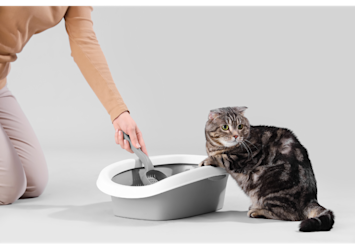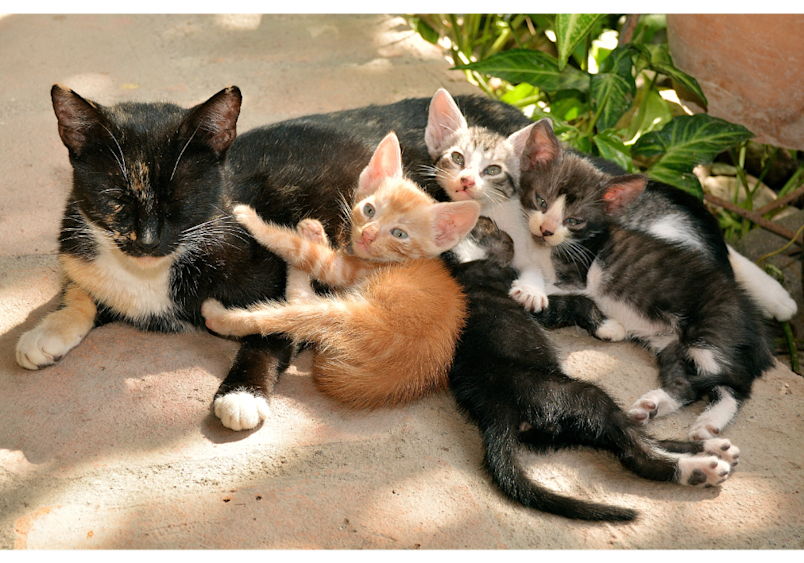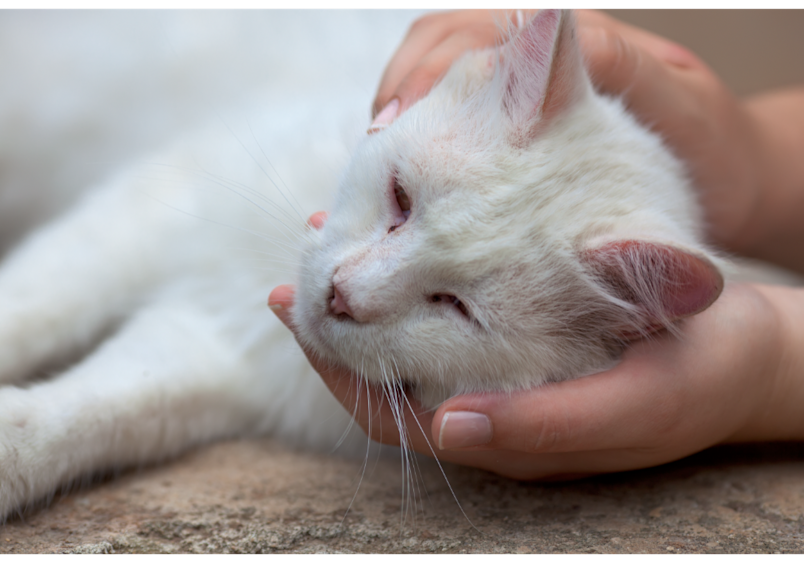
When you think about being a cat parent, you’ll likely think more about snuggles, playtime, and petting. What you likely don’t think about is monitoring their bowel movements and urinary habits. Though it may not be the most glamourous part of the job, being familiar with your cat’s litter box deposits provides great insight in their overall health and behaviors and can answer questions like: how often do cats poop? Do cats poop every day? Is my cat pooping as often as he should?
Knowing what's normal will help you more quickly spot the abnormal. We'll help you get to the bottom of how often a cat should poop and provide actionable steps for maintaining a healthy digestive system.
How Often Should Cats Poop?
Cats are obligate carnivores meaning they need lots of protein in form of meat. When compared to vegetables and grains, meat doesn’t take as much equipment, effort, or time to digest and work its way through the system. Because of this, a cat’s digestive tract is shorter than animals that eat plants, so most of your cat’s food will be fully processed with the waste products wanting to make an exit within 24 hours.
This means most cats will poop about once per day, but there’s going to be some variation, with some cats pooping a bit more frequently and some a little less frequently. So, the most important thing for you to do is determine what’s normal for your particular kitty.
Diet & Nutrition Affect How Often a Cat Poops
It’s mostly about the fiber. You’re probably well aware that fiber is a great natural treatment for many digestive issues. It’s no different for cats. Of course, fiber isn’t the only consideration, so here’s how diet can affect cat pooping.
Soluble fiber: This is the type that dissolves in the digestive tract. It forms a thick, gelatinous substance that slows down digestion and helps nutrient absorption. Soluble fiber is the best type to help with diarrhea, and cats that eat a diet high in this may see fewer bowel movements.
Insoluble fiber: On the other side is insoluble fiber which isn’t digestible. Instead, it goes through the digestive tract fairly unchanged, bulking up bowel movements and drawing water into the intestines. Lots of insoluble fiber tends to increase both the size and frequency of bowel movements, so it’s best reserved for cases of constipation.
Fat: High fat diets generally increase the frequency of pooping, especially if a cat eats a high amount of fat at one time.
Digestibility: The quality of a cat food plays a big role in how often a cat poops. The more digestible the ingredients are, the less pooping you’re likely to see. Generally, whole ingredients are more digestible than processed versions.
Lifestyle
Cats that are more active tend to have a more active digestive system as well. This means if your kitty gets regular exercise, they’re more likely to have regular bowel movements. Cats that take the couch potato approach may have slower digestion and less frequent poops.
Health & Age Considerations
Of course, there are age and health status considerations when it comes to how often a cat poops. Kittens seem to poop all the time because their digestive system is in development mode and not quite as efficient as it will become.
Then as cats age, their digestive efficiency decreases. While this doesn’t always change the frequency of pooping, you may see either an increase or decrease in the number of pooping times based on health conditions, such as inflammatory bowel disease.

Common Causes of Irregular Poop Patterns
A cat that’s filling the litter box at a rapid rate and a cat that seems to go days in between depositing nuggets may be affected by a variety of health issues. Those include:
Digestive issues
Inflammation, infections, cancer, etc. within the digestive tract can affect how often a cat poops simply by messing with the time it takes waste to move through. You may see diarrhea or constipation.
Systemic health issues
Issues that affect the entire body may be behind increased or decreased pooping frequency in cats. For example, diseases like diabetes or kidney disease may cause dehydration that can decrease pooping frequency, while things like hyperthyroidism with its effect on metabolism, may actually increase pooping.
Behavioral & environmental
Your cat’s pooping changes don’t always stem from bodily issues, sometimes it can be a mental thing. Since cats like things to stay clean and orderly, having a dirty litter box may turn them off to pooping. Cats may try to “hold it” for days instead of scratching around in a smelly box, so make sure you know how to clean a litter box properly. Litter box placement or type may have something to do with it as well. If the sides are too high for your arthritic cat to climb into, the litter texture hurts your cat’s paws, or you’re keeping the litter box in a high traffic area, your cat risks constipation rather than poop as normal.
When Cat Pooping Frequency Become Concerning
Yes, I’m basically telling you to pay more attention to your cat’s pooping habits. You can learn a lot about their health by doing so. Knowing your cat’s normal pooping schedule helps you to spot even minor changes while they’re hopefully still manageable.
While a single day of abnormal pooping may not be a major concern, it's wise to consult your veterinarian if you observe any of these changes:
Pooping more than 3-4 times a day
Hasn't had a bowel movement in a couple of days
Unusually watery or loose feces
Feces that are so hard they come out as dried nuggets
Blood, mucus, or an unusual color in your cat's stool
Decreased appetite
Lethargy
Vomiting
Stomach pain

Treatment for Cat Poop Issues
Getting to the bottom of your cat’s digestive issues isn't always cheap. While a basic check-up might be fine, diagnostic tests like blood work, fecal exams, and X-rays can start to add up. If a serious condition is found, the costs can get much higher. For instance:
Inflammatory Bowel Disease (IBD): The initial diagnosis can range from $500 to $3,000, with ongoing costs for medication and special diets.
Hyperthyroidism: The total cost for treatment can range from $600 for yearly medication to over $2,500 for a permanent procedure like radioactive iodine therapy.
This is precisely why having an Embrace cat insurance policy can be so reassuring. When you're worried about your cat, the last thing you want to think about is money. Pet insurance helps by reimbursing you for eligible expenses, allowing you to confidently say "yes" to the best treatment, knowing you have a partner to help with the costs.
Promoting Healthy Digestion
The best ways to keep your cat pooping right on schedule is to provide them with a high-quality, digestible diet, make sure they’re getting plenty of exercise, and keep their litter box clean. Scoop at least once daily, completely wash at least weekly, and stow it in an area that is easily accessible yet off the beaten path.
Also, keep in touch with your veterinarian. An optional cat wellness plan helps you budget for regular appointments with your vet to help your cat stay as healthy as possible.
So How Often Do Cats Poop?
The number of times your cat poops per day isn’t the most exciting thing you want to know about them, but it’s an important part of monitoring their health. Pay attention to how often your cat poops normally so that you can spot abnormalities right away. In general, look to scoop the box free from poop about once per day for most cats, but realize that that can vary with things like diet, exercise, and healthy conditions.
By embracing this kind of care for the less-glamorous details, you’re creating a foundation for a happy, healthy life for your kitty.